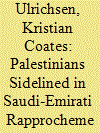|
|
|
Sort Order |
|
|
|
Items / Page
|
|
|
|
|
|
|
| Srl | Item |
| 1 |
ID:
162000


|
|
|
|
|
| Summary/Abstract |
This essay explores the genesis of the Great March of Return in the context of a fragmented Palestinian body politic, blockade, and occupation, highlighting two major issues: the Palestinian refugee plight and the decade-long blockade on Gaza. The essay argues that the march represented a rare opening for Palestinians in the Gaza Strip to reclaim a factionally controlled political sphere, and demonstrates that the organizers of the march valiantly strove to keep it going in the face of insurmountable challenges. It also contends that Israel’s bloody crackdown, the difficulties of organizing in a divided Palestinian body politic, and international inaction were factors in the protest’s loss of momentum, which ultimately set back the mass mobilization of the Gaza Strip. The march left Palestinians with many questions about the viability of nonviolent methods in the face of disproportionate Israeli force.
|
|
|
|
|
|
|
|
|
|
|
|
|
|
|
|
| 2 |
ID:
161998


|
|
|
|
|
| Summary/Abstract |
Political Zionism is based on the fallacy that there exists a single nation encompassing all the world’s Jews. How can Zionism claim that Israel is the nation-state of the Jewish people, since the only attribute shared by all Jews is Judaism, a religion and not an attribute of nationhood in any modern sense of the word? Jews can belong to various nations—a Jew may be French, American, Indian, Argentinian, and so forth—but being Jewish excludes other religious affiliations. Thus, this essay argues, the Zionist claim that all the world’s Jews constitute a single distinct national entity is an ideological myth, invented as a misconceived way of dealing with the persecution and discrimination suffered by European Jews, in particular. Indeed, from its earliest iterations and up to the present day, Zionism—a colonizing project—has been fueled by an inverted form of anti-Semitism: if, as it claims, Israel acts on behalf of all Jews everywhere, then all Jews must be collectively held responsible for the actions of that state—clearly an anti-Semitic position.
|
|
|
|
|
|
|
|
|
|
|
|
|
|
|
|
| 3 |
ID:
161997


|
|
|
|
|
| Summary/Abstract |
This article examines the formation of land defense in relation to changing legal and economic conditions in the occupied Palestinian territories. It argues that as a result of settler capital and law, Palestinian land defense should be understood as emerging through, rather than apart from, private property. Specifically, it explores how private property and market forces shaped agrarian land defense (1970s–1980s) and real estate land defense (post-2007). In the 1970s and the 1980s, land defense sought to protect agriculture against market forces that drew Palestinians off the land and into wage labor in Israel. Beginning in the 1990s, the exclusion of Palestinians from Israeli wage labor and new forms of West Bank governance created the conditions for real estate land defense to appear. Taking the real estate project TABO as a case study, this article details its political logic, unexpected market effects, and social and economic limits.
|
|
|
|
|
|
|
|
|
|
|
|
|
|
|
|
| 4 |
ID:
161999


|
|
|
|
|
| Summary/Abstract |
This essay examines how and why Saudi Arabia and the United Arab Emirates (UAE) have pursued policies that have aligned closer to Israel since 2011. The disruptive impact of the Arab Spring and its turbulent aftermath altered threat perceptions in Riyadh and Abu Dhabi, which increasingly saw Islamism and Iran as the major sources of regional instability. For Saudi and Emirati leaders committed to adopting a more forceful approach to shaping the post-Arab Spring landscape, Israel no longer represented the primary fissure in Middle Eastern politics. Although the process of creating informal ties between the Gulf states and Israel has been decades in the making, the nature of the post-2011 connections between Saudi Arabia and the UAE with Israel have greater strategic depth and are taking place in a far more open setting than ever before.
|
|
|
|
|
|
|
|
|
|
|
|
|
|
|
|
| 5 |
ID:
161996


|
|
|
|
|
| Summary/Abstract |
A careful examination of Palestinian service work in Israeli settlements and of everyday settler-Palestinian contact demonstrates how these encounters play a key role in normalizing the presence and dominance of settlers in the occupied West Bank. Based on ethnographic fieldwork at a settlement supermarket, this article shows that Palestinians are called upon to perform customer service in a setting where they are not only subjugated but are also coerced to help create the ultranationalist climate of their occupiers’ holidays. In addition to being compelled to normalize Israeli dominance, Palestinian workers are also the object of a seemingly contradictory orientation, one that favors not having Palestinians around at all. The article thus weighs in on the broader contemporary significance of Palestinian labor for the settler-colonial logics of Zionism.
|
|
|
|
|
|
|
|
|
|
|
|
|
|
|
|
|
|
|
|
|